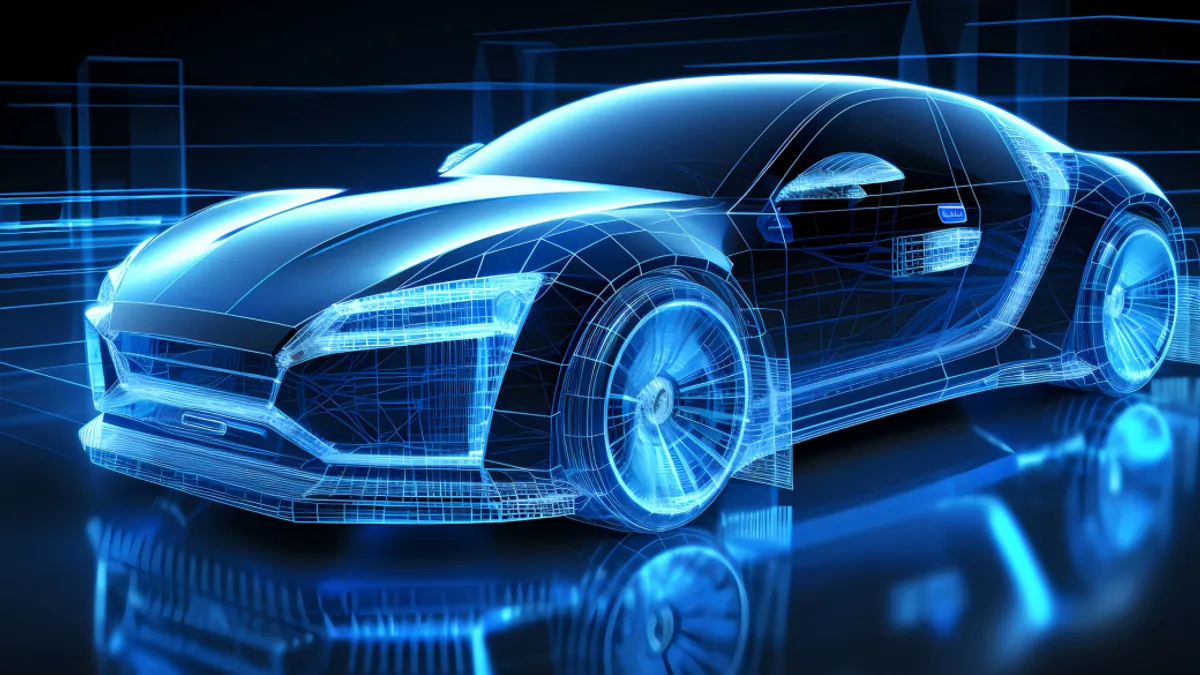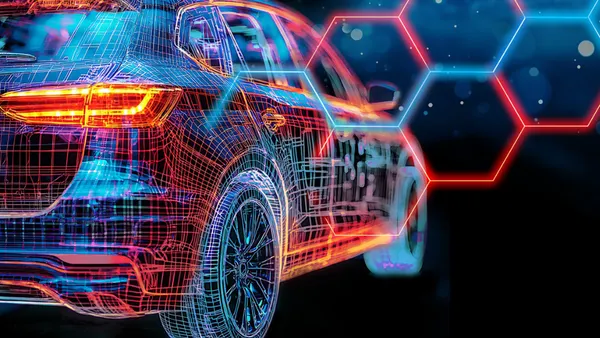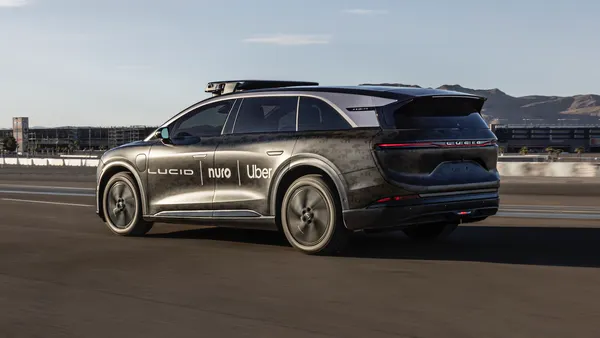The global automotive artificial intelligence (AI) market is projected to reach USD 15.23 billion by 2030, and most leading automotive manufacturers worldwide are working to integrate predictive analytics models into operations.
More recently, their focus has been on generative AI (GenAI), an emerging technology poised to substantially transform customer interactions, optimize numerous internal workflows and enable more streamlined, intuitive and immersive in-vehicle experiences.
How the biggest automakers are leveraging GenAI
Mercedes-Benz is one of the early GenAI adopters. The company is leveraging ChatGPT, the globally renowned GenAI-powered chatbot, to enhance its proprietary in-vehicle assistant ”Hey Mercedes,” which is used by drivers for navigation and various vehicle control functions. So far, this capability has been implemented in 900,000 vehicles within the U.S. market, but the company has indicated plans to continue expanding the integration of this technology more broadly in the near future.
In addition to customer-facing infotainment applications, Mercedes-Benz is ensuring its production line employees are also benefiting from ChatGPT integration. Within factories, the tool enables efficient consolidation of quality data from development, manufacturing and customer experience domains, significantly expediting the identification and analysis of defects.
Moreover, through data clustering techniques, ChatGPT simplifies complex evaluations and presentations of quality management and other production-relevant data, displaying insights in comprehensible formats. Additionally, the bot provides non-technical production staff with easy access to required manufacturing data through conversational interactions, eliminating the need for intricate programming commands or advanced technical knowledge. This user-friendly information retrieval approach enables personnel to iteratively refine queries until they obtain the needed level of granular insights.
BMW, which is also actively pursuing AI capabilities, leverages GenAI to achieve plant scheduling optimization, among other things. It has utilized an algorithm trained on various solutions created by traditional Machine Learning (ML) optimizer networks so as to generate a more efficacious scheduling optimization solution. Zapata AI, BMW's partner in this initiative, reports running approximately one million optimization cycles across numerous configurations, algorithms and optimizer categories in order to determine optimal solutions that are tailored to BMW's specific needs and constraints. The GenAI-based tool demonstrated performance improvements of 71% over other state-of-the-art techniques, significantly improving BMW's plant scheduling efficiency, minimizing idle time and facilitating precise production target achievement.
Toyota, another major automotive player investing heavily in GenAI techniques, developed a text-to-image tool that integrates early design sketches with engineering constraints. It also accepts parameters like aerodynamic drag as input to assist designers in creating fuel-efficient vehicles with fewer iterative cycles. This capability is especially relevant for electric vehicles (EVs), where optimized aerodynamics can substantially extend the vehicle’s range. Their GenAI system can also generate digital prototypes for simulated real-world testing, enabling engineers to identify and resolve potential design flaws early in the development process, resulting in major time and cost savings.
Toyota also uses large language models (LLMs) to augment support functions. It built AgentAsk, a proprietary chatbot akin to ChatGPT that provides employees with the necessary information while incorporating Toyota's specific enterprise requirements, including permissions, integration, security and privacy considerations. The organization states this bot has helped resolve or expedite hundreds of thousands of support tickets, freeing up human service desk staff to handle more complex problems like software approvals and hardware procurement requests. AgentAsk's 11.4-minute mean time to repair compares very favorably to the industry average of approximately three days. On a weekly basis, the system handles the workload equivalent to approximately 25 level-1 human service technicians, reclaiming over 70,000 personnel hours annually for higher-value activities.
Similar to Mercedes-Benz in Europe, Baidu also intends to deeply integrate GenAI into its next-generation vehicles, collaborating on this initiative with other automotive companies, including Great Wall Motors, Lynk & Co and Smart. However, specific details on the implementation haven’t yet been disclosed. What is known is that the Chinese manufacturers plan to utilize Baidu's proprietary Ernie 3.5 LLM, considered comparable in performance and in some ways superior to even the highly popular GPT-4 model, to enable advanced in-vehicle assistants.
Baidu states that numerous test vehicle interactions have already validated the viability of several innovative LLM-powered features, including consultative abilities, knowledge-based Q&A, personalized trip planning and creative drawing applications via text-to-image that provide entertainment options for child passengers.
Finally, General Motors (GM) has announced an engineering initiative to develop a chatbot leveraging Microsoft Azure Cloud services, which includes OpenAI's foundational ChatGPT technologies. While full details of the capabilities aren’t known yet, GM has confirmed plans to devise sophisticated functionality that goes beyond basic voice commands. For instance, in the event of a flat tire, the system could explain tire-changing procedures, provide concrete step-by-step instructions and even play explanatory videos on the vehicle console display. Likewise, when a non-critical repair indicator light activates, the chatbot could clearly explain the underlying issue and urgency level to the driver through natural conversation and potentially even schedule a service appointment automatically if desired, saving the driver time and effort.
Key considerations for automotive manufacturers seeking to maximize the potential of GenAI
Both automotive and technology companies have strived to make effective voice-activated interfaces a reality for many years, but the natural language processing (NLP) technologies were previously not advanced enough to enable robust conversational abilities. The recent proliferation of large pretrained transformer architectures powering systems like ChatGPT and Bard has finally provided the breakthrough capabilities required. Companies that moved quickly to adopt and integrate these technologies are poised to capitalize on this opportunity and outpace slower-moving competitors. For automotive manufacturers still lacking expertise in these areas, now is the time to close this gap with strategic partnerships for capability-building.
Other vital steps automakers should take when seeking to leverage GenAI include:
- Adopting a holistic initiative framework with a multidisciplinary team encompassing engineering, data science, IT, business and other relevant experts while developing an end-to-end process view that aligns people, processes and technology. This is critical to scale adoption across the organization. Firms with existing AI development platforms have a head start in accelerating integration.
- Carefully selecting the appropriate high-value use cases for initial focus, while picking quick wins that can clearly showcase GenAI’s value early on or in finding opportunities to optimize end-to-end processes with the biggest potential for benefit.
- For organizations still early on in the maturity curve with GenAI techniques, launching pilot projects on existing technology platforms can help build expertise in a low-risk manner, while forming partnerships with experienced tech firms can help expedite the delivery of capabilities.
- Comprehensively analyzing both the financial and operational impact of GenAI investments against projected benefits and productivity gains, along with prioritizing use cases with the most favorable and strategic net impact first.
If you’d like to learn more about how to leverage the latest AI technologies to enhance operational efficiency, future-proof your businesses and secure a competitive edge, contact us here.










